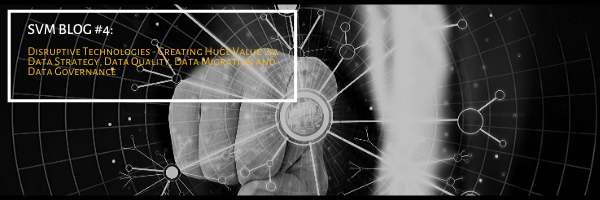Get to know the value of your data. Are you data-driven? Does data drive to outcomes, or inhibit? Data can be an asset. It can be a liability. Data can be transformative. It also can be disruptive.
A good data strategy and good data can help prevent you from becoming disrupted.
Some of the most compelling examples of data-driven companies are Uber, Facebook, Google, and Amazon. In our previous blog post #2, “Data Creates Huge Value – What is the Value of Your Data?”, we explored how they create colossal value and have incredibly high market capitalization with relatively small investments in assets, because of their strategic use of data.
These companies have great data strategies. Amazon stands out because it disrupts the retail market – well-known, long-standing retailers are closing shops (blaming Amazon). But not all of them, some have foreseen the disruption, acted, and upgraded their go-to-market. The common theme is, they are using data as a tool to avoid disruption.
Good data strategy facilitates good business and helps defend and insulate you from sudden regulatory changes, market changes, competitive threats, and supply and demand chain disruption.
A few examples of disruptive events include going back about five decades, to the present time, and near-future (timeline may not be precisely correct):
- 1960’s / 1970’s
- Introduction of the mainframe computer, and ‘dumb’ terminals
- 1980’s
- Personal computers, and floppy drives, and the “Mac” computer
- IBM, DEC/HP, Microsoft, Apple (Windows OS vs. Unix vs. Mainframes)
- CD’s and DVD’s (Encyclopedia Britannica died, didn’t transform from hardcopy)
- DARPA and the Internet, Web browsers, AOL, Netscape
- 1990’s
- Relational databases, Tera-byte drives
- Encryption and IT security (and software viruses, malware, hackers)
- Millenia “bug” and Dot-com mania (and high-tech crash of 2001, before “911”)
- Wi-Fi vs. RS-232, and cell phones with 3G, 4G and now 5G cellular networks
- 2000’s
- Smartphones, Smart cars, Smart grid
- Facebook, Uber, Instagram, LinkedIn … and Netflix (and gone is Blockbuster)
- Financial crash of 2007
- Caused by collateralized debt obligations (CDOs) (overly aggressive use of leverage by banks involving high-risk mortgages), caused by, some would argue, the partial repeal of the Glass-Steagall Act of 1933 by the Gramm-Leach-Bliley Act of 1999
- Some protections were reinstated in 2010 with the Volcker Rule, which was part of the Dodd-Frank Act
- 2010’s
- Machine Learning, Internet-of-Things, In-Memory Computing
- GDPR, other regulatory data protection and other rules
- Electric cars and trucks (and the improving batteries and motors that power them)
- Clean energy like Solar and Wind power, and Battery Electric Power Storage technologies
- Some argue that solar and wind will surpass oil and gas as the least expensive form of energy sometime within the next couple of decades, maybe sooner, depending on regulatory changes and innovations in technology and methods
- Solar energy benefits from Moore’s Law, which states essentially, in this case, the conversion of sunlight to electrical output energy of solar panels will continue to improve by about double every couple of years, hence making solar panels more economically viable than other forms of energy
- Self driving cars and trucks that are electric and are powered by solar and wind
- 2020’s
-
- Diseases like the sudden pandemic of the Corona virus and impact on world markets
- Potential for natural disasters and impacts of changes in the environment
- Robots, AI, proliferation of smart grid, smart homes, smarter phones, smarter cars / trucks, the Intelligent Enterprise, learning companies lead by learning machine
- 2030’s
-
- And so on (The Matrix, Terminator, Bionics, Cure for Cancer) … what can we imagine?
We can refer to these events as “Black Swans” – they are (somewhat) rare, and sort of ominous compared to white swans. For each disruption, dinosaur-like industries fade away (and certainly the laggards of those industries fade), and new industries/companies are created or replace them.
Adaptive companies see the many challenges coming and pre-actively setup strategies and plans to get out of the way of disaster and capitalize on the opportunities created by the impending change.
Change is inevitable. Resistance is futile. We must adapt or fade.
Investing in new ERP with in-memory computing, high integration, intelligent enterprise, real-time reporting, and actionable analytics promises to help transform companies, help them capitalize on opportunities, and better position for the challenges and changes ahead. This requires not just a lift-n-shift of existing data from older, siloed, less-capable applications into the new landscape, but a transformation of data so it will support the new business models and challenges head-on, as an asset.
Data is an asset if it creates, not destroys, value.
Data Strategy is what you do with your architecture, organization, technology, applications, networks, and data to facilitate not just the data transformation, but the business transformation. It is a journey. It must be planned, with contingencies, adaptable and flexible, and re-adjusted every year with a 5-year and 10-year time-horizon. Think of good data as insurance against failure for the future.
Data Strategy and Good Data is insurance against business failure. Remove bad data as a source of failure in your business.
What is that worth to you and all the employees and their families, if you go the way of Encyclopedia Britannica or Blockbuster? What if you don’t literally fail, but languish and slowly fade a death of a thousand cuts, compared to your competitors? What if you are the disruptor using creative, innovative methods to change the game?
Either be disrupted and play the game of catch-up or be disruptive and lead the pack.
Don’t just make that $100M+ investment in transformation. Add another 10% to make data a competitive advantage: include a Data Strategy, Data Governance, Data Migration, and Data Quality program, all working in concert with your IT planning and line of business owners, to help assure you transform successfully, reduce risk and take advantage of the next disruptive cycle. Think of it as an insurance policy to remove data as a source of failure in your future.
Change your thinking. Change your industry. Know the value of your data.
Contact Utopia Strategic Value Management (SVM) at SVM@UtopiaInc.com for more information.




